Amazon Alternatives: The Top 10 Sites to Sell Online
Online shopping is a convenient option for people without access to nearby shopping centers or those who live far from large cities. Other than consumers, online marketplaces are also helpful among those who want to invest in small businesses.
With the booming eCommerce industry, many business-minded individuals want to dive into the lucrative business of online selling. After all, it is the only way to have flexible working hours and the chance to work anywhere. These are the usual reasons why online seller wannabes seek resources about how to sell on Amazon FBA. Who wouldn’t want to be interested when Amazon had a whopping $469 billion revenue last year! And nearly 22% of that is made by third-party sellers who use Fulfillment by Amazon. The earning potential is expansive, providing a way for some folks who want a side hustle on top of their primary employment.
Why Sellers Love Amazon?
As an Amazon seller, you have access to a market with over 100 million Prime members that typically spend more than $1,000 a year. Even without prime membership, Amazon customers spend $100-$500 a year on the website. The opportunity to make money is huge, so most would search about how to become an Amazon seller before researching the more essential details of eCommerce.
Amazon is too prominent to ignore, so many people would automatically think that knowing how to be an Amazon seller is a must. The problem is that becoming an Amazon FBA seller is not for everyone. No
e-Commerce site can ever match its reach, but there are undoubtedly good Amazon alternatives that you can make a living off.
If you are considering setting up an online shop but find it overwhelming to become an Amazon seller, this article is for you.
Why Should You Look for Amazon Alternatives?
When a customer goes to Amazon and searches explicitly for a product and a seller, a typical scenario is that the specific company and item do not come up first in the search results. Not unless the seller pays extra for advertising. And that is not the only thing you will pay for when selling on Amazon.
You must pay a monthly subscription fee for a professional plan if your store sells over 40 items monthly. Individual account plans, or those selling less than 40 products monthly, do not have to pay for a subscription. The downside is that Amazon collects an item fee, referral fee, and a variable closing fee for every item sold. This might pose a problem for small businesses struggling with making sales and getting their ROI.
Even when you can close sales, Amazon takes a big chunk of your profits, so you sell your products for less money. Since you are using the platform, it is Amazon that “owns” the customers, and you may not have access to the customers’ names and contact information. This limits your customer reach and marketing opportunities. Such details are helpful when you want to improve your marketing strategies or when you are trying to develop or enhance products.
It is also a very competitive marketplace with almost ten million sellers. Optimizing your listings and being on top of your competitors is plenty of work. This is not conducive for new business owners who are still learning the ins and outs of the eCommerce industry and are also desperate to earn their keep.
Truth be told, selling on this platform can be expensive and stressful. It will be great to know Amazon alternatives because reaping the rewards of your hard work will be sweeter if you sell on cheaper, simpler, and less competitive online marketplaces.
Amazon Alternatives: The Top 10 Sites to Sell Online
It might be an online marketplace giant with millions of buyers, but selling on Amazon can also drag your business down. If you are wondering what opportunities lay beyond Amazon, it is enough to know that the internet is a big world of platforms to sell your business online. Many Amazon alternatives are at your disposal.
Here are ten options you can explore as alternatives to Amazon:
1. Building Your Own Online Store/Website
Undoubtedly, the best among all Amazon alternatives is to create your online store from scratch. A custom online shop gives you total control over the look and feel of your storefront. This is perfect if you want to present a unique brand story to boost brand awareness.
There are plenty of options to build a nice-looking website for a low price. There’s an array of website creation tools and plugins, like WordPress and WooCommerce, that startups can use to create an eCommerce website. It is possible to do most of the work independently since most website building platforms have drag-and-drop builders and other simple tools.
It is easier for customers to find you directly if you have your online shop or a website. They can directly buy from you after learning about your products on your website. This method is very effective if you are looking forward to developing more loyal customers.
You can decide how to market your products with an independent online store. Instead of relying on shopping platform members, you can try plenty of ways to introduce your company to a broader market. Experiment with social media marketing, email marketing, influencer marketing, and other methods to find out which will promote your products best.
The best part of having your website is keeping 100% of what you sell. You will not hesitate to offer discount codes and other attractive promotions to lure customers in because you know how much profit you earn.
Having more control, you tailor your business according to your target market’s preferences.
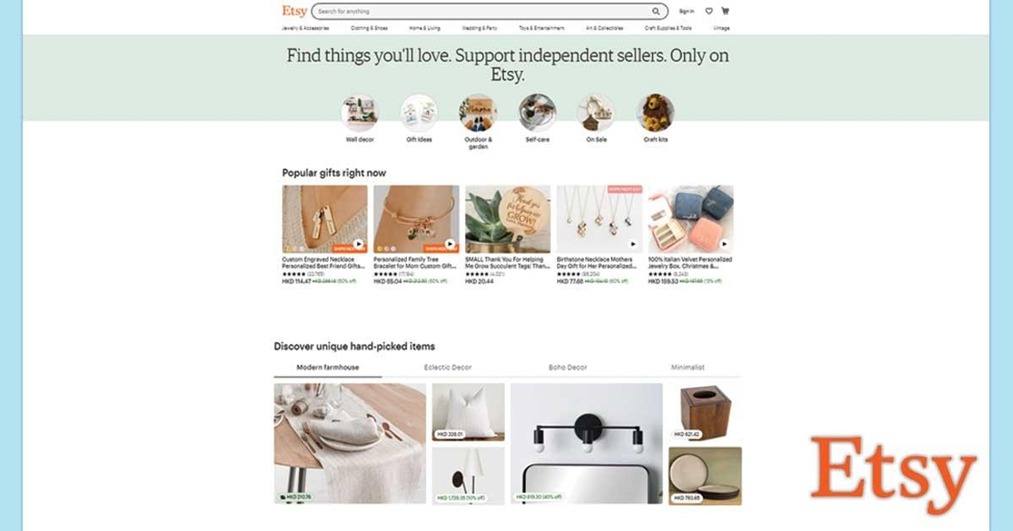
2. Etsy
If you want to do a business out of your hobbies, Etsy is the best platform to be in. This marketplace for makers has buyers who appreciate handcrafted products. The site does not limit to crafts, DIY kits, and vintage items to sell. Although it showcases small businesses with a handmade feel, a broader range of items is also allowed, including manufactured products.
It is free to join, and the listing fee is $0.20 each and a 5% commission on each item sold. It is cheaper, and listings on Etsy last for four months. Amazon can list your products as active forever, but you must send inventory to the FBA Fulfillment Center. As for offsite ads, you will pay 15% of the item’s price, but only if you make a sale out of the ad.
Etsy is the perfect platform to emphasize craftsmanship and quality in your brand. It is simple to use, has powerful tools to customize online store design, and is cheaper to maintain.
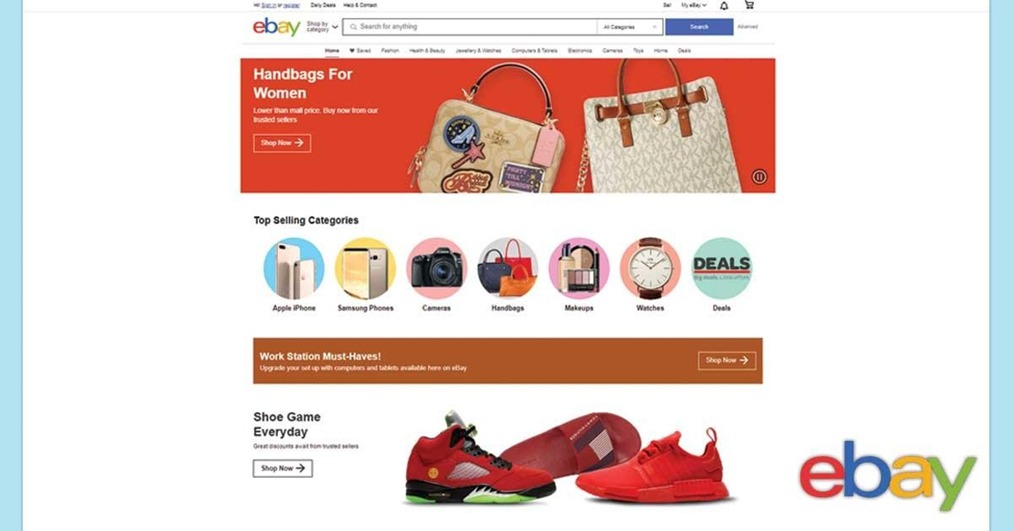
3. eBay
Although it was known as an auction site for used items, eBay transformed into a thriving marketplace for online sellers. The main difference between eBay and Amazon is that eBay sellers can put up an auction and a Buy It Now pricing. The Best Offer sign can also be added to the listings if the seller is willing to negotiate with the buyers for the final price. It may take a lot of research to understand the fee structure fully, but it is all worth it because this website is designed for eCommerce vendors.
eBay is popular among online sellers because it has a lot of simple tools to market any business. Although you can do more with a remove bg tool, it has a basic tool to clean product images and add a white background before listing. You can create listings for free, but you need to pay around a 10-20% commission fee for each item sold. Selling Manager Pro and Stores are additional features with a service charge.
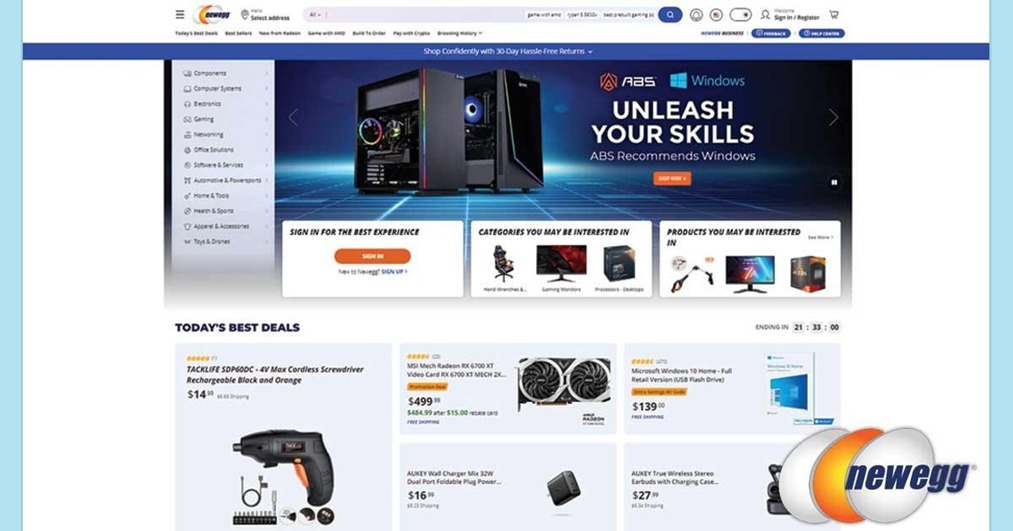
4. Newegg
Since its launch as a third-party marketplace in 2010, Newegg has transformed into a one-stop-shop for
tech-related products. It is a go-to marketplace for consumer electronics, computer hardware, and other stuff.
What makes it more valuable is that it can facilitate both B2C and B2B worldwide. It also has its order fulfillment service, like Amazon FBA, called Shipped by Newegg or SBN.
The perks of using Newegg, even with a free account, is that sellers are given the freedom of product data management, so it is possible to promote your brand. Commission fees can go as low as 8% and are capped at 15%, allowing you to make as many sales as possible without worrying about losing a lot for using the platform.
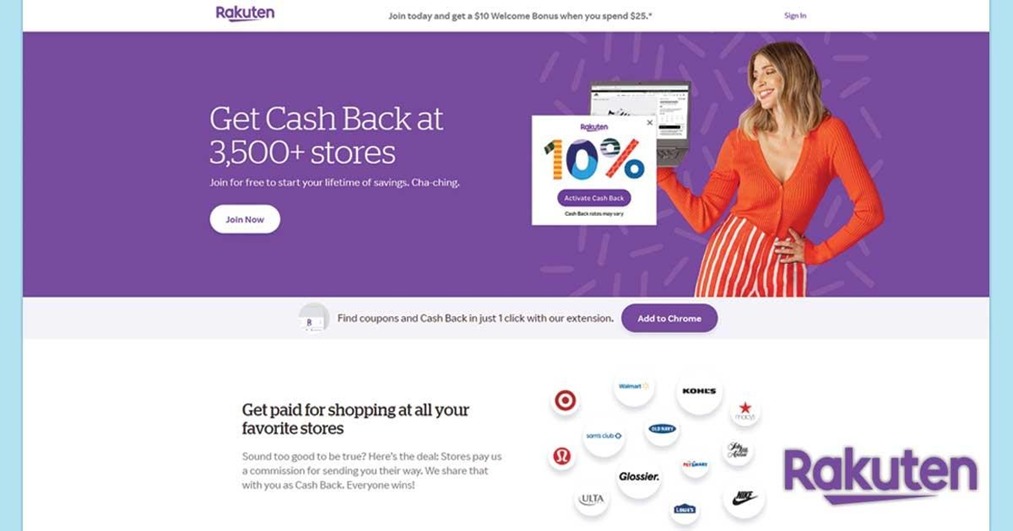
5. Rakuten
Formerly buy.com, Rakuten is like the Amazon of Japan. It is similar to Amazon in that it collects a monthly seller fee on top of other expenses for the product category and a commission for every product sold.
Unlike Amazon, however, Rakuten does not have its own brand or products to sell on the website, so it does not compete with its vendors. This is important because, with Amazon, the competition is heightened even more because it heavily promotes Amazon products more than the items from individual sellers. Rakuten also allows more room for store customization to design a storefront that aligns with your company’s branding.
The excellent seller tools and being highly versatile are Rakuten’s best features. It is perfect for those who would like an opportunity to do business in Japan since, although it transacts worldwide, its market is mainly Japan’s internet users.
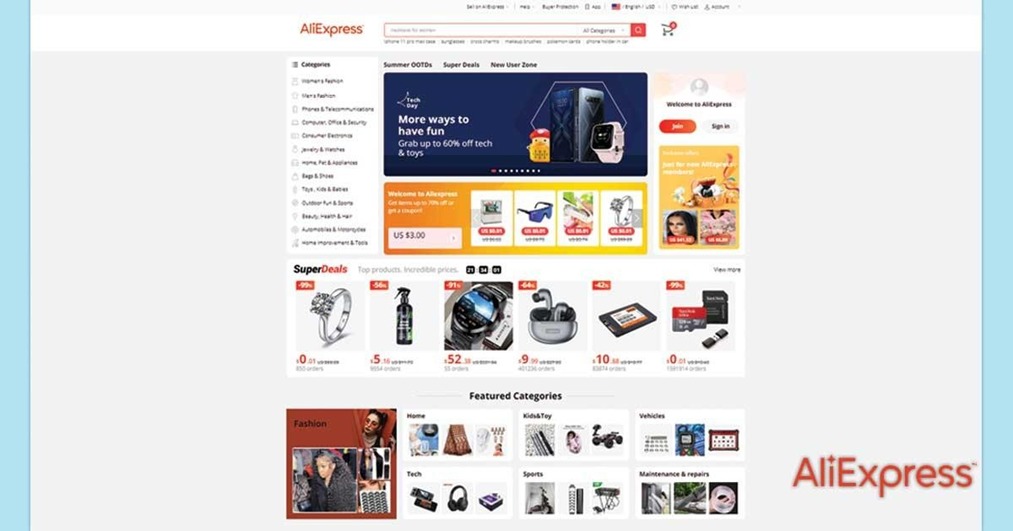
6. AliExpress
Unlike its parent company, Alibaba, AliExpress does not require a minimum order quantity (MQQ) to sell products. This dropshipping concept is excellent for those who cannot physically hold stock and will rely on suppliers to ship the products to the customers. It offers lower risk to people who want to open an online shop with only small capital for startup costs.
AliExpress is one of the best Amazon alternatives because it has the same range of products but at lower prices. This is due to several factors, like production costs and product authenticity. It is likely to find cheap items on AliExpress because their products are made outside the US, where production costs are really expensive. Upon checking, you can see that Amazon also sells items from the same countries of origin. So it is counterproductive to pay for higher membership and other fees if customers will have the same products.
It is, however, the seller’s obligation to check the products from the suppliers for quality. It would help if you built a good reputation by selling products that will surpass the customers’ expectations. With due diligence, this should be a minor problem, considering that you will have limitless potential when choosing it as an eCommerce partner.
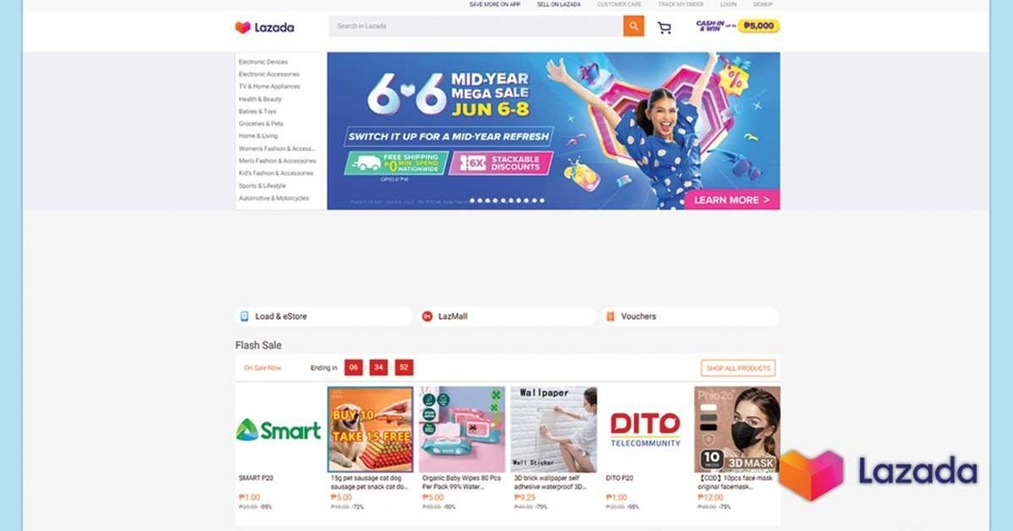
7. Lazada
As the largest Amazon competitor in Asia, Lazada is popular because it has a vast inventory of foreign goods. It is easy to purchase products from Asian countries and has affordable logistics solutions that are great for cross-border transactions. It adapts C2C and B2C hybrid business models where users can buy from other users and sell the products.
You can start selling immediately without paying monthly seller fees or setup fees. It only charges 2% for payments and 1-4% cross-border order value commission. Sellers have the option to deliver products through Lazada Global Shipping or arrange the deliveries with other shipping solutions.
This platform has a lot of free resources for sellers on Lazada University to help maximize their business using the marketplace. This is a valuable feature for those who are dabbling into the eCommerce business for the first time. Because of the much lower rates and excellent support compared to other online marketplaces, Lazada is an attractive option if you want to expand into the Asian market.
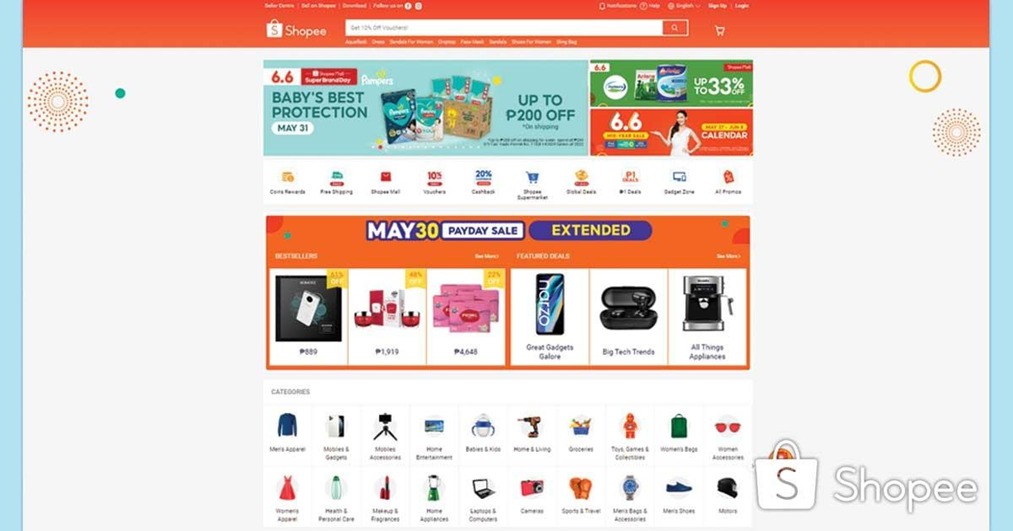
8. Shopee
More than an eCommerce site, Shopee is a social platform where the members are so in tune with the shops. The number of followers and fans helps the store offer a better shopping experience. The reviews guide the sellers about what the buyers want from them. This concept works well with customer-centric shops because they can easily discuss with customers regarding feedback and suggestions.
Business-wise, setting up a Shopee store is a breeze and completely free. It also provides shipping and logistics services so you can focus on improving your shop and expanding the business.
Shopee also has its cross-border program called Shopee International Platform or SIP. This allows sellers to expand their businesses overseas for no additional costs. To enhance its platform services, Shopee collects a 2% commission, collected six months after listing the products on the marketplace. It also offers a lower commission fee of 1% if a seller participates in the Free Shipping Special and Coin Cashback programs.
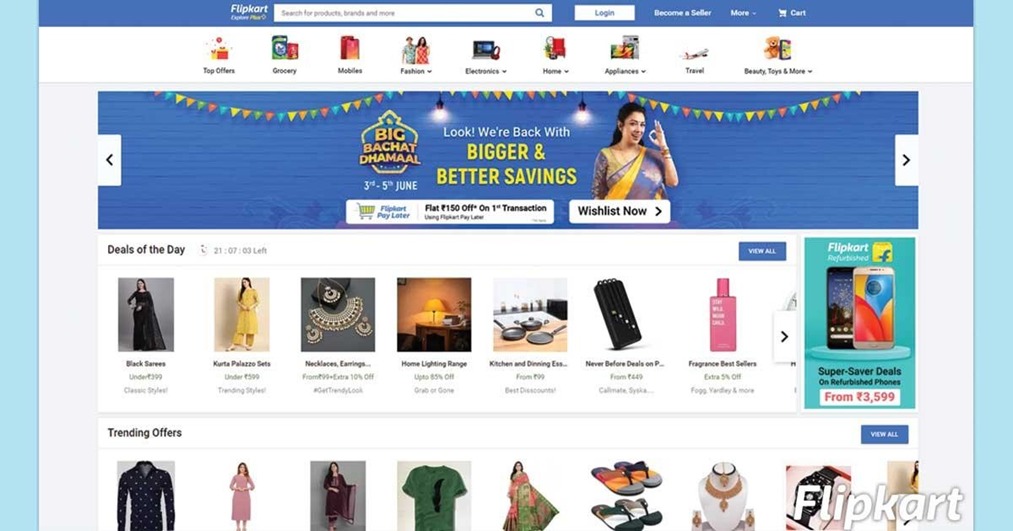
9. Flipkart
Unlike selling on Amazon, a minimal investment is all you need to become an eCommerce player on Flipkart. They have experts who help set up a store and list products. It supports WooCommerce, so you can easily integrate an existing online shop to Flipkart.
Flipkart collects a commission, shipping, collection, and fixed fees depending on the order item value and category. The rates are very minimal, thus allowing you to boost your eCommerce sales.
The advantage of using Flipkart is that it is a simple way to expand your business to a global market. With its Seller Protection Fund, Flipkart safeguards its sellers against any losses while using the platform.

10. Barnes & Noble
Although Barnes & Noble is the largest bookstore, it is also a marketplace for movies, toys, games, and music. It is the perfect eCommerce partner if you are serious about building a business empire concerning books.
This is because it has features and programs that benefit members who are die-hard readers. It is one of the top Amazon alternatives if you sell books mainly because they do not have to deal with fulfilling a broad list of products.
Comparing the costs, flexibility, and other parameters, you now know that these Amazon alternatives can be better, especially for small businesses. With some of these marketplaces not requiring initial fees to set up, you can use multiple platforms and quickly diversify your income streams.
Conclusion
There is no stopping the eCommerce industry from continuously booming. Online shops are more popular than ever, so it is time for you to get on this modern business bandwagon.
Contrary to popular belief, selling online does not require in-depth knowledge about creating websites or the different business models. There is a bevy of tools to set up an online shop so you can immediately start selling goods online. You may also join marketplaces as an eCommerce platform for your business.
Among the many online marketplaces for small to large businesses, Amazon remains the top choice for various reasons, mainly because of its millions of members worldwide.
It goes without saying that what makes Amazon attractive to online sellers is the massive audience. Millions of people shop from Amazon, even non-US residents. No one can’t deny its power in e-Commerce, but the website has evolved significantly over the years. Various policy changes, the competition, and the high cut in the sales price are just some of the reasons why many sellers quit Amazon.
There are options if you start by testing the waters first, like Etsy, where you can concentrate on a small business with a particular market. A niche-specific marketplace like Barnes & Noble is your best bet if you prefer to sell only one product type. Building your website is the best alternative if it is the competition, listing fees, and commission you can’t handle.
